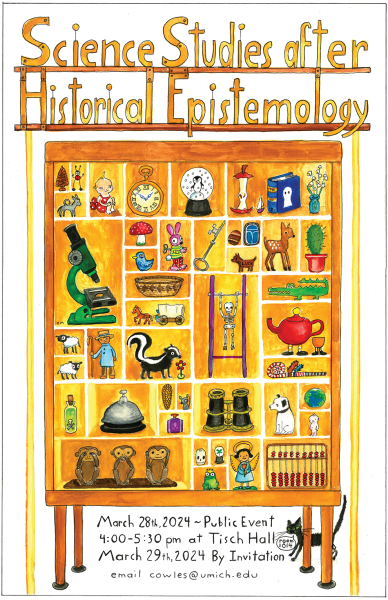Science matters. Over the last half-century, a field—called science studies—has emerged to explain why. Science studies accounts for science’s remarkable authority in many ways, calling attention to techniques of persuasion, regimes of labor, and forms of materiality that underwrite science’s power and practice. Uniting this diverse range of scholarly approaches is a focus on “knowledge.” Since the 1980s, scholars of science studies have focused almost exclusively on the production, circulation, and contestation of knowledge. Knowledge has retained this priority even as its basic categories—objectivity and proof, trust and truth—have come in for historical and social analysis. Science’s importance, in other words, is rooted in its ways of knowing.
This workshop looks beyond “knowledge” for alternative categories and concepts at the edges of science studies. Leading scholars will present a range of critical terms as possible futures for science studies, questioning the identification of “science” and “knowledge” that was cemented with the rise of “historical epistemology” over the last few decades. Drawing on theoretical turns in fields near and far, we will consider the possibility of a science studies centered on roots and vibrations, habits and beliefs, the sacred and the type. The workshop remains committed to the idea that science matters; what participants are after is a new account (or accounts) of why, new frameworks within which old binaries fade from view and new political possibilities emerge.
Join us on March 28 at 4:00 pm in 1014 Tisch Hall for the public event.
This workshop looks beyond “knowledge” for alternative categories and concepts at the edges of science studies. Leading scholars will present a range of critical terms as possible futures for science studies, questioning the identification of “science” and “knowledge” that was cemented with the rise of “historical epistemology” over the last few decades. Drawing on theoretical turns in fields near and far, we will consider the possibility of a science studies centered on roots and vibrations, habits and beliefs, the sacred and the type. The workshop remains committed to the idea that science matters; what participants are after is a new account (or accounts) of why, new frameworks within which old binaries fade from view and new political possibilities emerge.
Join us on March 28 at 4:00 pm in 1014 Tisch Hall for the public event.
| Building: | Tisch Hall |
|---|---|
| Event Type: | Workshop / Seminar |
| Tags: | Anthropology, Astronomy, Basic Science, Biology, Biomedical Engineering, Biosciences, Books, Chemistry, Civil and Environmental Engineering, Climate and Space Sciences and Engineering, Ecology, Education, Electrical Engineering and Computer Science, Engineering, Environment, History, Humanities, Information and Technology, Interdisciplinary, Life Science, Mathematics, Medicine, Michigan Engineering, Natural Sciences, Psychology, Public Policy, Science, Social Sciences, Sociology, Undergraduate |
| Source: | Happening @ Michigan from Department of History, Eisenberg Institute for Historical Studies |
The Thursday Series is the core of the institute's scholarly program, hosting distinguished guests who examine methodological, analytical, and theoretical issues in the field of history.
The Friday Series consists mostly of panel-style workshops highlighting U-M graduate students. On occasion, events may include lectures, seminars, or other programs presented by visiting scholars.
The insitute also hosts other historical programming, including lectures, film screenings, author appearances, and similar events aimed at a broader public audience.


